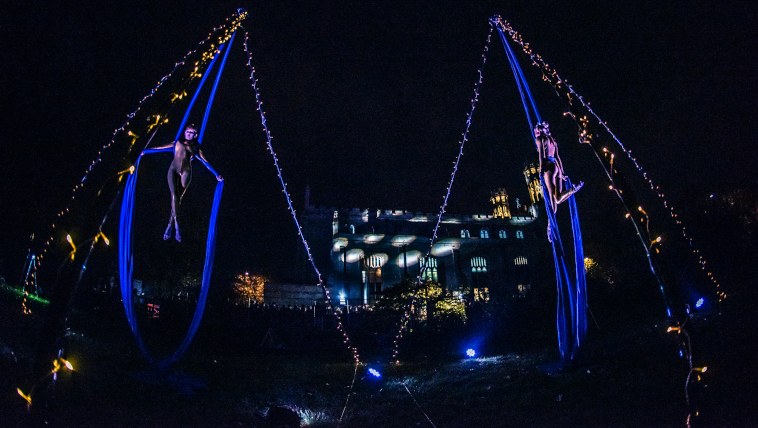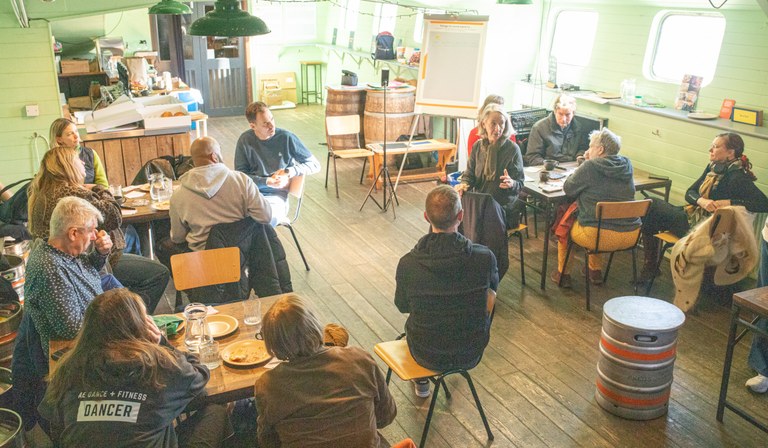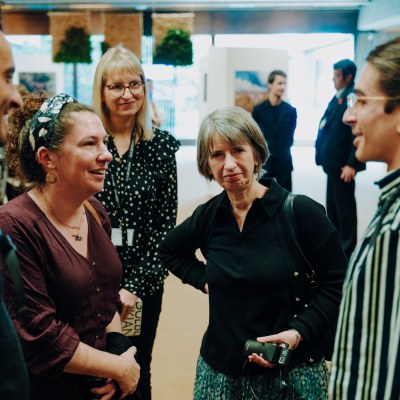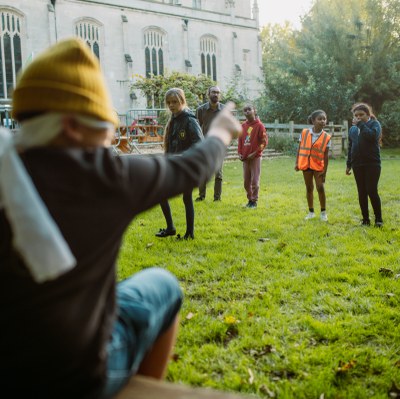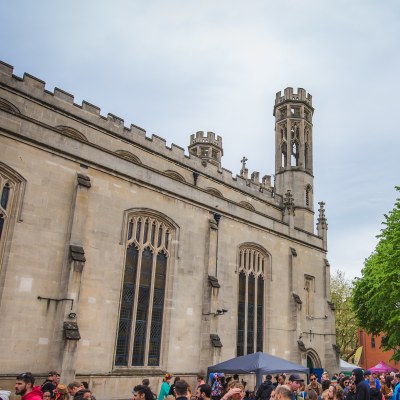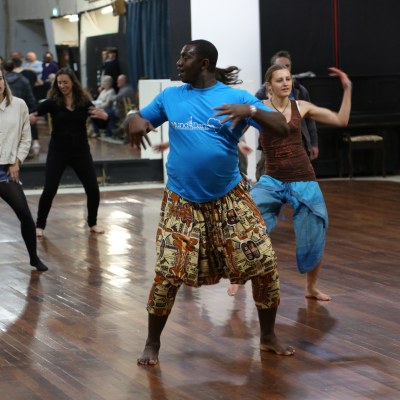Opinion: Money Matters
Opinion: Money Matters
Art is circus, not economic gymnastics - Image by Khali Ackford
As Peter Holbrook, CEO of Social Enterprise UK, challenges the definition of the £428bn “impact economy”, our CEO Emma Harvey asks, what if we stopped counting?
Money Matters: Or why should we stop counting
A quiet shift’s been happening towards the language of economic impact underpinning most conversations about the value of arts, culture and civic life. It’s about maths right so it’s important, or so we tell ourselves. Only, it doesn’t hold any value to us or our people. A kind of gymnastics, only it's all contortion without a rhythm or flow and leaves us feeling hollow. If you’ve found yourself sleepwalking into measuring legitimacy through this lens and wondered, how did we get here? you're not alone.
Profit isn’t a dirty word. Many charities are social enterprises in some form and should absolutely measure profitability. We know what makes a surplus and what that surplus has to carry. Whoever you are - and especially if you have less of it - financial literacy is survival. Money matters.
But it is also reductive. It flattens complex human work into numbers never designed to hold it. And we’ve seen what happens when this logic hardens. Take NEET contracts reengaging 16-18 year olds. Early on at Trinity we were able to make contacts like this work, to give intensive support to those young people whose needed it most. But over successive contract cycles, payment-by-results milestones became unattainable for smaller providers, shifting provision towards volume. Quietly, young people were sorted into those who were fixable and fundable and those too costly to help. If value’s only defined economically, what becomes of us unviables?
Economic impact does little to convert minds not already convinced. The economic case for culture has been made repeatedly by folk with far more letters after their names than me. We know about local economic multiplier effects and how vibrant cultural spaces animate high streets. When art makes a place thrive speculative investment often follows. That movement of money is all the proof you need.
Getting small organisations to count what doesn’t matter all that much to people distracts and detracts, pulling scarce energy towards chasing ghosts. Time is spent proving, calculating and modelling experiences into metrics to services decision-makers we may never meet. It shapes programmes around what can be counted rather than what is needed. Measurement isn’t neutral; it consumes time, attention and worst of all our spirit. And like any beast, we’ll never fully sate it.
Economic impact language blurs the boundary between profit and purpose. Peter Holbrook, chief executive of Social Enterprise UK, recently warned of this risk, with the £428bn “impact economy” defined in a way favouring investor-led models over ones built explicitly for public benefit. When everything is framed within the same metrics it’s a game we can’t win. It allows those primarily driven by profit to say, “Oh yes, we also care too”. And then carbon offsetting permits continued extraction and recycling bins in clothing stores capture our sense of doing good while production patterns remain unchanged. Language that - if we also adopt it - softens the edges of power structures to allow them to remain unchallenged.
Community organisations cannot outcompete on terrain designed for capital and conquest. Adopting this language without challenge collapses extraction and reinvestment, shareholder return and community accountability. The promise that continued growth will eventually lift everyone impact rests on a fading ideology and many communities have lived long enough through iterations of that promise to treat it with scepticism. That’s dangerous especially right now because it deepens disenfranchisement of those who already have lost trust and faith in decision-makers' intentions. Growth is happening just not for you. You don’t matter to us.
When we centre growth as proof of value we risk reinforcing the same scarcity logic that traps minds and builds conflict. Someone else out there is winning whilst I’m losing. We risk aligning ourselves with a world that many already experience as failing them. When growth doesn’t translate into feeling better off, people look sideways to see who is benefitting. And then we're in cookie cartoon territory, where the dude sits behind a plate piled high pointing at the one due opposite the other whilst saying, He's taking what's yours. It's data to stoke tension between those who feel they’re losing out because of a notion of a transaction happening elsewhere that’s making someone else better off. And as we're all butting heads, deeper extraction continues unchecked.
Money matters for most only in the direct transaction sense. Pay people to do the work that needs to be done as well as you can afford. Don’t ask artists to work for free. Pay young people for their time. Pay communities for their advice. Do not ask people to do more with less while citing economic impact. Don’t push the boulder up the hill by exploiting your team or yourself. If a claim made somewhere doesn’t translate to wages if folks’ pockets it’s a story that rings hollow. I can’t pay my bills with your data.
None of this means abandoning accountability to funders. We should measure what keeps us afloat and be transparent about our finances. When asked to show GVA, it might be worth asking what they’re looking to understand from those numbers, who needs to be assured and whether the absence of economic data lessens the legitimacy of the work. If their response is to scratch their heads and say they don't know and that someone further up the chain is asking, that might at least give us pause for thought. Provide the data and still ask the questions, because following instructions unquestioningly is how we uphold bureaucracies at the expense of ourselves until we all wind up doing more work for less meaning, trapped in a system that rewards compliance over change.
There is no reason for thinking
That, if you give a chance for people to think or live
The arts of thought or life will suffer and become rougher
And not return more than you could ever give
Louis MacNeice, Autumn Journal (1939)
From Use or Ornament, Comedia’s report on the social value of the arts, 1997
At Trinity, I cannot promise folk I’ll make them rich. What I hope we offer is a place for people to come to find connection and build meaning together. A place where stories are shared, mistakes are made and power is practised differently, even if it doesn’t always work out. People come at times at a crossroads in their lives and often move onto bigger and better things. Like that old slouchy jumper, you love it till you wear it right through. It’s a place where value is measured by knowledge, energy and commitment to making things as good as possible with what we have.
The only real arbiter of wealth is the money in my pocket. In what I can give that I don’t need paid back. In the time that it affords me to worry about it less and care about what gives me meaning more. “What is it that breathes fire into the equations and makes a universe for them to describe?” said Stephen Hawking. Is the arbiter of our worth counted by pounds and pence or the smile on our face at the end of the day and the energy we find to get up again tomorrow. In this world of the now that’s rich with data yet poor on trust, culture’s the fuel for growth, turbo charging connection, courage and conviction. Right now, that may be the more honest thing to count.
This is an opinion piece by Emma Harvey, CEO
Stop Consulting Citizens: Start Sharing Power
Stop Consulting Citizens: Start Sharing Power
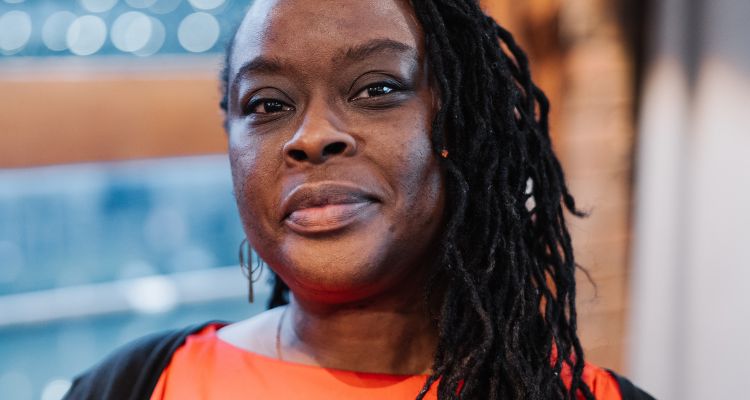
By LaToyah McAllister-Jones, Citizens for Culture / Co-Lead Facilitator
The cultural sector often talks about participation.
We talk about engagement.
We talk about listening.
But a month after launching the Citizens for Culture report, the outcome of the UK’s first Citizens’ Assembly for Culture in the West of England, I think we need to ask a harder question:
Are we really ready to share power?
Because citizen-led work doesn’t just produce plans.
It exposes how decisions are made, who makes them, and how willing we are to change.
The response to the report has been overwhelmingly positive. Across the region, there has been curiosity and genuine appetite for the work. But what matters now is not how warmly the plan has been received; it’s what we’re prepared to do differently as a result.
And that is where the real challenge begins.
The pace of trust, not the pace of systems
Citizen-led processes are slow.
They take time to listen properly. Time to deliberate. Time to work through the disagreement. Time to build shared understanding. Time to understand the trade-offs.
They move at the speed of trust rather than the speed of delivery targets or funding cycles.
Over the past four years, Citizens for Culture has developed through testing, learning and adaptation. Nothing was rushed. Nothing was fixed too early. Each stage shaped the next.
This runs counter to how much of our sector operates. Our systems and processes reward speed, certainty and control. We are used to producing strategies quickly and demonstrating immediate impact.
But if we genuinely want decisions shaped by lived experience and not assumptions, we have to honour the process. We cannot invite citizen voice and then contain it within systems that remain unchanged.
Deliberation is not delay.
It is democratic practice.
Consultation is not the same as sharing power.
For years, the cultural sector has been good at consultation.
Less good at redistributing influence.
Too often, participation happens at the edges of decision-making rather than at its centre. Citizens are invited to contribute, but rarely to shape priorities, resources or direction.
What has been different about Citizens for Culture is the coalition that has emerged around it. Across the West of England, local authorities, cultural organisations, funders and community partners have begun aligning around a shared direction, not through mandate, but through collective commitment.
This matters. Real change happens when people choose to move together.
But intent alone is not transformation. The real test is whether we are truly prepared to let citizen priorities influence how decisions are made, how resources are allocated and how organisations behave.
If participation does not shift power, it risks becoming performative, undermining the very people it set out to engage and collaborate with.
Sharing power means letting go
Citizen-led work asks something fundamentally different of institutions and leaders.
It asks organisations to listen before acting.
It asks expertise to sit alongside lived experience, not above it.
It asks leaders to loosen control and accept uncertainty.
This is not simply a new methodology. It is a shift in mindset.
And that shift can feel uncomfortable. It challenges professional identity and long-established ways of working. It requires humility and openness. It asks us to move from authority towards collaboration.
We need to be honest about that.
But if we want cultural policy that reflects the lives of the people it serves, this shift is not optional. It is necessary.
Discomfort is not a problem to solve.
It is evidence that something real is changing.
Strong partnerships, stronger responsibility
This work has been strengthened by partnership with Arts Council England and the West of England Combined Authority. Their involvement provides legitimacy, resource, and regional momentum. It signals that citizen voice should sit at the heart of cultural decision-making, not at the margins.
But institutional support must also lead to institutional change.
If citizen voice is to be centred rather than symbolic, systems of funding, governance and decision-making must evolve to reflect it. Otherwise, participation risks reinforcing the very structures it seeks to challenge.
The opportunity now is to embed this work, not simply endorse it.
Why this matters beyond culture
On a personal level, this work has reinforced my belief that people are ready to shape the systems that shape their lives. Designing adult-to-adult relationships that value people, time, and input produces open and engaged spaces.
What has often been missing is not capacity, but access.
Not interest, but invitation.
Not ideas, but influence.
At a time when trust in institutions is fragile, citizen assemblies offer something powerful: a way to reconnect decision-making with lived experience and rebuild relationships between people and public systems.
This is not only about cultural policy.
It is about democracy in practice.
What happens next is the real test.
We now move into the next phase of the work, the Citizens for Culture roadshow across the West of England.
This phase is not about presenting a finished plan. It is about working together to understand what delivery looks like in practice. It is about asking difficult questions:
What are we prepared to change?
What are we prepared to share?
What are we prepared to let go of?
The work ahead will be incremental. It will be complex. It will require courage from institutions and individuals alike.
But it offers the possibility of something different; cultural policy shaped with citizens, grounded in lived experience, and shared across the region.
That is the opportunity in front of us.
Come into the conversation.
If you’re part of an organisation, network, community group or partnership across the West of England and want to explore what this could mean for your work, invite us in.
The Citizens for Culture roadshow is about meeting people where they are: listening, challenging, learning together and working out what shared responsibility really looks like.
If this approach resonates with you, or even if it makes you uncomfortable, we want to hear from you.
Because sharing power only works when more of us are willing to try.
Sharing power is not a gesture; it’s an intentional choice. The question is whether we are ready to make it.
Let There Be Light!
Let There Be Light!
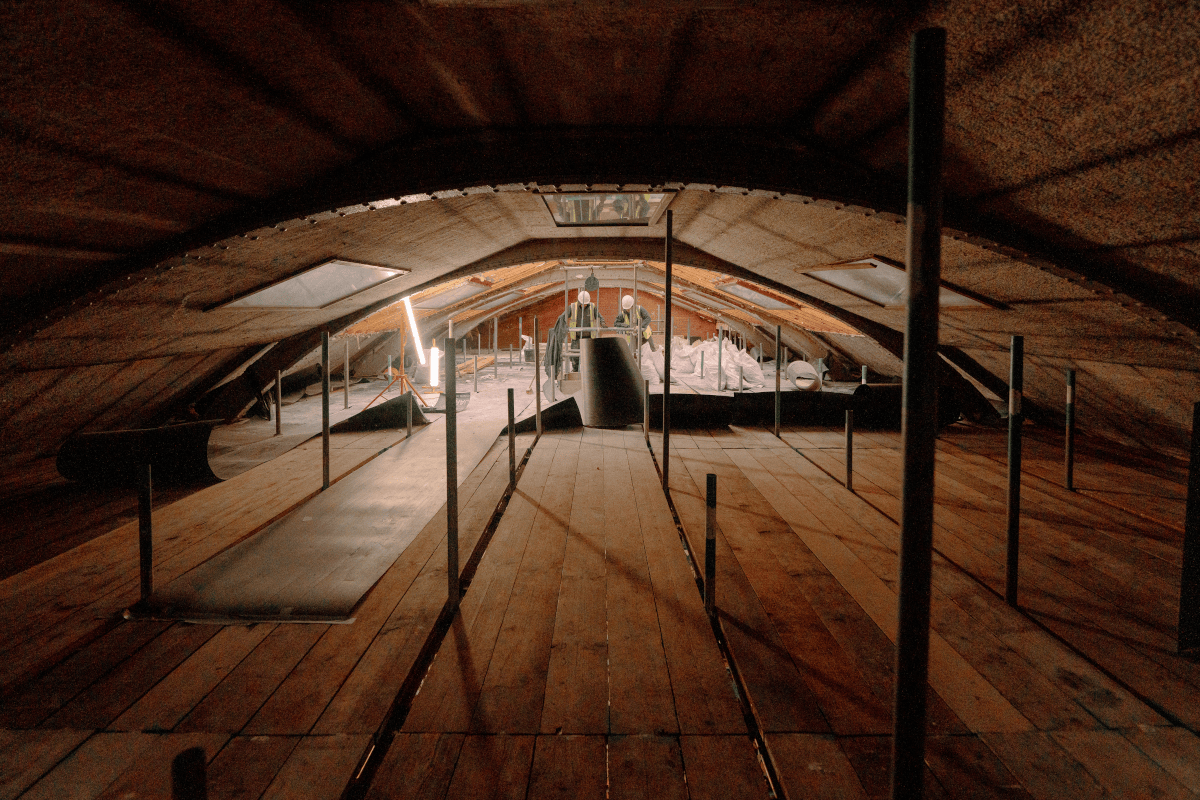
Let there be light! Carrek Ltd work to reveal lantern roof at Jacobs Wells Baths. Photos: Elliot Thingston
"Have you forgotten about Jacobs Wells?”
This was my partner, chatting to me last week because January’s been all systems go and all I've been chatting about of late is Citizens for Culture and deliberative democracy and City of Culture and creativity for everyone and Solar Opposites and Pokémon etc etc...
Like him, some of you may have walked past Jacobs Wells Baths and seen scaffolding shooting up and started wondering what on earth is going on inside. Has Emma forgotten about her building babies? Has she finally lost the plot?!
Perhaps.
But behind the boards and beneath the dust, something extraordinary is happening. And we let photographer Elliot Thingston (with his PPE on) inside to take a sneaky peak. As work continues overhead, the transformation may not yet be fully visible from the street. But believe me when I say, the Baths are beginning to breathe again.
As part of the ongoing restoration works to save this building and restore it for the community, heritage contractors Carrek Ltd have been working to remove the internal roof fabric. The old, damaged acoustic foam left behind from its time as a dance centre has revealed for the first time since 1984 the building's original glass lantern roof. When the foam started coming down, we began to see the outline of the lantern structure. To watch the main hall flood with daylight. That was special. You could suddenly understand the architect’s original intention.
What’s Happening Now
The team is removing damaged internal acoustic foam and carefully exposing the historic lantern structure. Original timber and ironwork are being assessed and restored, new glazing is being installed, solar panels added, and external masonry repaired. Phase 1 costs £2.2m and is scheduled to be completed Autumn 2026
Contractors can at times seem faceless, but not this crew. Keith Hoskins, Director of Carrek Ltd is one of the many true passionate folk involved in this recovery effort. I’ve been involved in a few capital projects over the years with my other building baby, the Trinity Centre (don’t worry, I haven’t forgotten her either), and this is the first time I’ve seen someone so utterly determined to climb eight tiers of scaffolding just to witness a moment of restoration. But that’s what a project like this does. It pulls people upward.
A passion project for spirited souls just like Keith. When I was chatting to him up there in the roof heavens he spoke excitedly about the original timber roof noting that, while some areas of the structure have deteriorated over time, the overall quality and craftsmanship of the materials and original build is remarkable.
The team’s priority is to conserve and repair as much of the historic fabric as possible. The existing timber frame will be carefully restored, with a new glass roof introduced above it; one that honours the original design while ensuring the structure performs to contemporary building and environmental standards.
What’s Happening Next
Phase 2 will focus on the restoration of internal fabric and adaptation of the space in response to community consultation. This will include renovation of the interior, a new entrance, WCs, and lift, as well as interpretation and signage, plus a heritage learning and participation programme. Phase 2 costs are estimated at £5.5m and are expected to begin in Spring 2027 (subject to funding)
There’s something deeply symbolic about light returning to this building. Jacobs Wells Baths has always been a place of public gathering and shared experience. Seeing the lantern revealed I hope will serve as a reminder that this isn’t just restoration. It’s a revival.
This is why I am so in love with old buildings. Because, at the beginning, there’s a surge of excitement in that moment of possibility. Then the hard graft begins and it’s all scaffolding, dust, rubble and drilling and pulling things apart and board meetings and spreadsheets and budgets and cost rationalising and more meetings and and and.
And for a while, hope vanishes behind hoardings. And we find it hard to hold onto that end goal of a reimagined space for us. But it’s precisely in these messy, unseen stages that something extraordinary starts to happen. The foundations are laid and that art of the possible truly begins, nudging us steadily closer to that magical moment when the space opens once again and the vision becomes a reality for everyone.
It’s not always easy to create moments inside the building to connect with supporters while major works like this are underway. So, I hope these images offer a glimpse into that window of possibility. A way to see the craftsmanship and care that hides behind the scaffolding and for you all to continue to have faith in us.
I share this to give love and thanks to my dedicated professional team and so people can feel part of the journey. We’re deeply grateful to our community, funders and partners for sticking with us through the complex stages of restoration, and we’re hopeful about what this moment of light signals: the start of the future of this extraordinarily handsome building.
Phase 3 to be continued...?
Because this is not a building story. It’s a flippin’ love story. And all the best love stories come in three parts.
By Emma Harvey, CEO
Thanks to our funders: We’re incredibly grateful for the continued support of our funders and supporters, including MHCLG (Community Ownership Fund), Architectural Heritage Fund, Historic England, The Nisbet Trust, John James Foundation, Merchant Venturers Charitable Trust, Centrica: Energy for Tomorrow, The Pilgrim Trust, Bristol City Council, Sylvia Waddilove and all our individual donors and sponsors. We could not do this without you x
No Booze, All Bass: How Bristol Sober Spaces Is Changing Club Culture
No Booze, All Bass: How Bristol Sober Spaces Is Changing Club Culture
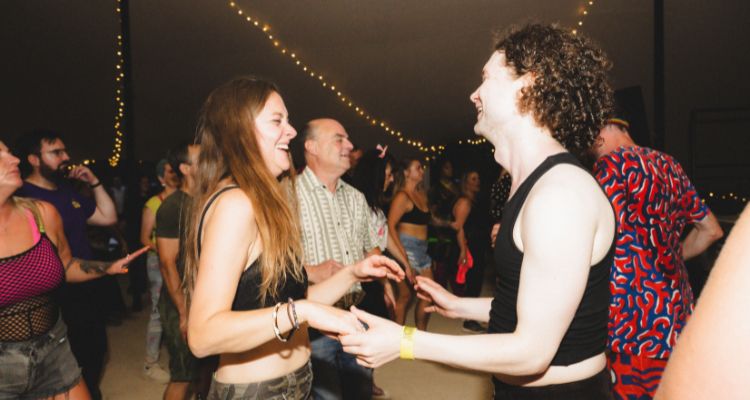
Dry January is in full swing once again and has many people are rethinking what a night out can look like. Bristol Sober Spaces, based within Creative Communities at Bristol Drugs Project (BDP), are challenging the idea that alcohol is essential to nightlife. Ahead of their second annual Dry January Rave at Trinity, we caught up with BDP to talk sober partying, community, and why these events are striking such a chord in Bristol.
First things first... what are Bristol Sober Spaces?
Bristol Drugs Project (BDP):
Bristol Sober Spaces is an events project offering great nights out with one simple twist: no alcohol or other drugs. Whether you’re sober for religious reasons, identify as being in recovery, or just fancy a change of pace, everyone’s welcome.
Why was Bristol Sober Spaces set up?
BDP: We launched Bristol Sober Spaces in 2022 with a really straightforward mission: to host regular, high-quality, accessible and affordable live events that are completely drug and alcohol free. We originally began with National Lottery funding through Not Saints (the world’s only recovery record label) and are now firmly established within Creative Communities at Bristol Drugs Project.
Some people still assume sober events are niche, what’s your response to that?
BDP: Our events stand up as great nights out in their own right. People come for the music, the atmosphere and the energy, and then appreciate the added benefits afterwards: no hangovers, saving money, enjoying music with a clear head, and feeling part of a growing community and scene. The audiences are really engaged and present, and that creates a special vibe on the dancefloor.
What kind of events have Bristol Sober Spaces hosted so far?
BDP: We’ve collaborated with venues and partners including Trinity, Rough Trade, Loco Klub, Jam Jar, Basement 45 and Bristol Beacon. Musically, our events have covered drum and bass, garage, world, hip hop, house, metal, punk and queer club nights, there really is something for everyone.
You’re teaming up with Trinity again for the Dry January Rave, what can people expect?
BDP: We’re absolutely buzzing to be back at Trinity. This year’s Dry January Rave features an incredible line-up, headlined by drum and bass hall-of-famer Jumpin’ Jack Frost, alongside Savannah and Costlycover. Expect a properly high-energy night of heavy drum and bass and jungle — just without the booze.
Why is Dry January such an important moment for these kinds of events?
BDP: January can be one of the darkest, coldest months of the year, and people still need spaces to dance, connect and release some dopamine. Our Dry January events show that you can still go out, party, and feel part of something — without alcohol being at the centre of it.
How has the response been from audiences and artists?
BDP: It’s been amazing. Each event seems to grow, with more new audience members, more artists getting in touch to perform, and more venues wanting to collaborate. Our Dry January Rave at Trinity has seen tickets fly, which really proves there’s a space for sober events in Bristol’s nightlife.
“Bristol Sober Spaces just keeps getting bigger and bigger – more new audience members, more artists getting in touch to perform, and more venues wanting to collaborate. Our Dry Jan Rave at Trinity is looking like it’s going to sell out which just proves there’s a space in the Bristol nightlife scene for sober events.”
— Sophie, Bristol Sober Spaces
What do people say about attending sober events?
BDP: The feedback is incredibly positive, from both participants and performers.
“These events are not just for people that are sober because maybe they've had a problem in the past, but also for people that just don't want to wake up tomorrow with a hangover.”
— Event participant
“There's something really special about playing at sober events. People are so engaged and so present.”
— Milly on Air, DJ
“You're surrounded by people that are present and engaged. It's just one of the best feelings being on the dancefloor without alcohol.”
— Event participant
Event details
What: Dry Jan Rave with Jumpin' Jack Frost
Where: Trinity Centre (Fyfe Hall), Trinity Road, St Jude’s, Bristol, BS2 0NW
When: Sat 24 Jan 2025
Time: 6–9pm
Tickets: https://hdfst.uk/e140394
Age: 18+
Free entry is available for personal assistants/carers, please get in touch to register.
Contact:
bristolsoberspaces@gmail.com | 07593 259 257
www.soberspaces.co.uk
Instagram: @bristolsoberspaces
Championing Women in Live Music
Championing Women in Live Music
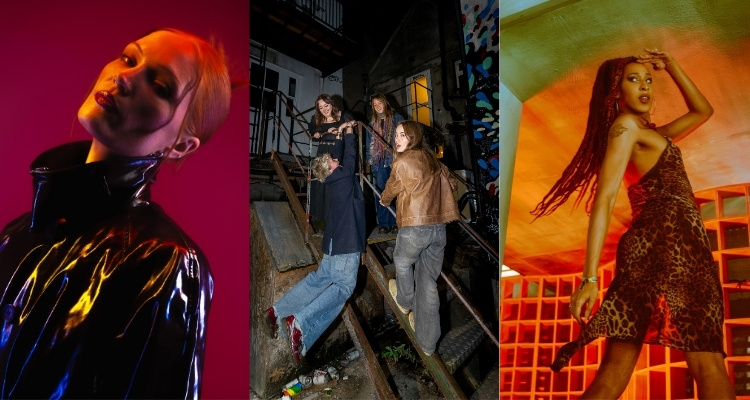
Trinity launches Seedling Sessions 2026 with International Women’s Day showcase celebrating women shaping Bristol’s music scene
Trinity will mark International Women’s Day 2026 by launching a new chapter of Seedling Sessions, spotlighting women shaping Bristol’s grassroots music scene both on and off stage.
Taking place on Sunday 8 March 2026 in Trinity’s Fyfe Hall, Seedling Sessions: Celebrating Women in Music continues the Trinity Presents 2026 programme with a bold, women-led showcase as part of Trinity’s 50th year of community arts.
Founded in 2016 by Bristol artist MĀDŁY, Seedling Sessions was created to address the lack of accessible platforms for emerging artists and creatives, particularly women and people from underrepresented backgrounds. This celebration builds on that legacy with a renewed focus on off-stage pathways, alongside live performance for women and non-binary local talent.
This iteration of Seedling Sessions launches at a time when gender inequality remains deeply embedded across the UK music industry.
Despite women making up over half of the music workforce, they hold just “27% of CEO roles” within the UK live music sector (LIVE & Women in CTRL, 2025). On stage, representation remains similarly uneven, “63% of acts were male, compared to around 21% female or female‑fronted acts,” equating to roughly one woman for every three men booked (A2D2, 2024). Behind the scenes, the imbalance is most extreme, with women making up just “5–7% of audio engineers and producers” (Birmingham City University / UK music technology sector estimate).
This edition of Seedling Sessions showcases local independent artists working across hip hop, pop, dance, punk and alternative music, while recognising the technical, creative and organisational roles that make grassroots music possible, reflecting the depth and diversity of women driving the city’s grassroots music scene today.
Line-up announced:
Badliana
A Bristol-based artist known for her dark and alternative sound, blending grime, rap, and alternative R&B with haunting vocals. A fearless performer, she has gained support from BBC Radio 1, BBC 1XTRA, and BBC Introducing. Currently part of Big Team's Next Level program, she is gearing up for 2026 with new releases, including the single "Bright Lights."
RED
RED is an exciting new voice in pop and dance music. Based in Bristol, this singer, songwriter, and producer blends infectious beats with emotionally charged songwriting and self-created 3D visuals. Her unapologetically queer, genre-defying music fuses glossy pop, underground club energy, and personal storytelling.
Moxie Dolls
An all girl alt/indie rock band from Bristol, advocating for feminist change in the music industry. Known for their catchy riffs and heavy sound, they have sold out venues like The Louisiana and Café Kino while building a strong presence in the local scene.
Speaking about Seedling Sessions, founder Cassie MĀDŁY commented:
“Seedling Sessions started 10 years ago as a response to seeing how many talented people were being overlooked or excluded from opportunities in music, especially women and people from underrepresented backgrounds. This International Women’s Day show isn’t about box-ticking – it’s about recognising the women who are already shaping our scene, on stage and behind the scenes, and creating space for them to thrive.”
One previous sound technician, Eleri Hewitt commented:
"Breaking into live sound can feel really closed-off, especially if you don’t already have connections. Seedling Sessions opened a door for me, it wasn’t just about helping out, it was about being supported and taken seriously."
This show forms part of Trinity Presents, Trinity’s in-house programme bringing outstanding performers and exciting new voices to communities at the heart of the city. The announcement follows previously revealed Trinity Presents shows, including Grove (sold out), and Mia Kodan & Friends.
As Trinity celebrates 50 years of music, community and empowerment, Seedling Sessions 2026 reinforces its ongoing commitment to nurturing talent, amplifying underrepresented voices, and supporting the future of grassroots music in Bristol.
Event listing details
Seedling Sessions: Celebrating Women in Music
Date: Sunday 8 March 2026
Time: 5:00pm – 8:00pm
Venue: Trinity Centre, Fyfe Hall
Tickets: Available via Headfirst
Age: 14+ (under 16s must be accompanied by an adult)
Last entry: 2 hours before curfew
Getting Discomfortable
Getting Discomfortable
The Seers, Welcome to Deadtown, 1990
On the day of the announcement that Bristol intends to bid to become UK City of Culture 2029, Trinity's CEO Emma Harvey reflects on comfort, justice and freedom of expression...
Folk are fed up with feeling broke. With political change being slow. With public services not working properly. Fed up of being polite and patient while people with power blame and game. Time poverty shrinks our lives. The ground beneath us feels uncertain.
This town is dead, it's a living hell...
I listen to the Seers and scroll through socials. It's the day after Martin Luther King Jr Day. A day that since Regan’s office has been marked as a US federal holiday. Jeanne Theoharis - who's has spent decades interrogating the myths we tell about one of the most recognisable civil rights activists - reminds us, injustice is comfortable for too many people. Silence permits cruelty. Comfort begets control.
A legacy that may have at times become flattened into a dreamy utopia, with King upheld as a non-threatening ‘colourblind’ figure. This isn’t accidental. It reassures the status quo and eliminates discomfort, to uphold politeness at the expense of justice.
The removal of free national parks on MLK Day and Juneteeth may serve as a reminder of King’s rage at economic and health injustice, his clarity about power and the complicity of politeness. His insistence that financial and political imbalances block true democracy if not robustly challenged. Politeness + comfort ≠ change.
Back in Bristol, I read a newsletter from Curiosity UnLtd who's Creativist leader Julz Davis been driving a campaign for Bristol to celebrate it’s role as Home of Civil Rights in the UK. Recognition of Bristol as a city of changemakers not waiting for permission and making their own opportunities.
That's the spirit of Bristol that matters. Not as branding, but as a way of being and just getting on with stuff. Because waiting for permission is another form of comfort. And comfort is what shrinks our minds and our worlds.
Art doesn’t decorate movements. It sustains them, says Julz. Creativity that's about truth-telling and shining a light on injustice where regular discourse falls short. A culture of asking difficult questions whilst also celebrating joyously that helps us imagine the ancestors we want to be and the role we want to plan in the world we’ll eventually leave behind.
We’re all frogs in the pot. Going along with process because we’re all so deep in it. Accepting the terms. Competing for funds like City of Culture and Pride in Place. A window of opportunity, but a window nonetheless that risks creating a sense of scarcity and of pitting places and communities against each other for central government funding, even though we know culture is a public good and civic life is essential to all of us. Without addressing that power of how we consider and distribute resources, participation is theatre not justice.
I want to shout but I can’t make a sound
Without the whole town coming down
There’s no-one around
I can’t dance, I can’t sing, I can’t do anything
Welcome to deadtown
The song continues as I read social posts asking so what...what can culture do about all that? These things tend to be gravy trains for a few. It will make no difference to most of us. This can be true, but that does not mean that we should not at least try.
That's the challenge of a UK City of Culture year for Bristol and we must take up that challenge if the benefits are to be felt. Bristol, like the UK doesn't lack creativity and is seen to be comparatively culturally resourced. But this hides more complex narratives, not least that we have a creative workforce that delivers far beyond the city's geographical boundaries, working across the UK on major cultural commissions and festivals, including playing visible roles in the delivery of City of Culture programmes in other UK cities.
And yet still we're a city whose networks can feel opaque and decision-making spaces unreachable. Systems that aren’t designed to make space for the art of the possible. People are muted. Expression is risky. Joy is rationed.
On the flipside, culture is passion. It’s activism. It’s identity. It's a shared memory. It’s the space where difficult conversations can happen - not as abstract debates, but as continued deliberation - a relay race passing the baton onto the next generation to build from where we tried and got some stuff right but still have work to do. Culture doesn’t change the world on its own: it creates the conditions for change. In a sea of voices telling us what to think and who’s right and who’s wrong it gives us a moment to close our eyes and hear our own voice and a tool to convert that voice into action to take about what matters to us.
The real test isn’t whether the whole city agrees or disagrees that we should go for this. It’s whether we stay in the room when things start to get uncomfortable - or even show up in the room when we’re invited. Discomfort isn’t the enemy - it's possibility. Talking to someone you disagree with and softening our edges. Taking a chance on a new artwork and seeing the world through a different lens. Speaking to a stranger and learning something new. Letting your certainty wobble to bring a skip to your step.
New worlds are built from shared courage. We don’t have to have all the answers right now. That’s why it’s called work. Believe in this. Believe in us. We’re all we’ve got. We’re our best chance. The work that needs doing will only come from us, together - locally and globally - communities refusing silence, complicity, refusing the polite status quo.
Shout in support of Bristol UK City of Culture. Shout in disagreement. Shout from the rooftops. It’s our time to bring our global town alive. Let’s go dream big.
This is an opinion piece by Emma Harvey. Click here to read more about Bristol's UK City of Culture bid.
Bid for UK City of Culture
Bid for UK City of Culture
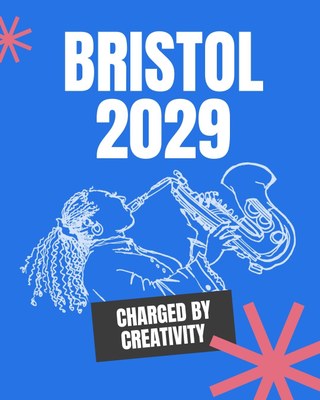
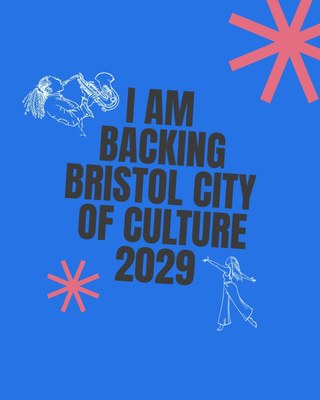
Trinity's backing Bristol's bid to become the next UK City of Culture - a title that celebrates creativity, community, and the power of culture to transform lives.
“Bristol looks like a richly creative city from the outside, but too many artists are forced to leave because they can’t afford to live or build a sustainable career here. UK City of Culture could be a once-in-a-generation chance to carefully develop the whole ecosystem from affordable studios and skills to commissions and progression so talent can stay, grow and thrive, and help forge a new generation of artists in the city.” Paula Orrell, Trustee
In 2024 Bristol's Green Party set out how Bristol prides itself on being a diverse, creative and green city and their commitment to lead a Bristol regional bid to become the UK’s city of culture. Following a committee meeting today, 20 Jan 2026, Bristol's councillors voted to honour that comitment and take forward a bid for the city to become the next UK City of Culture, 2029.
Bristol City Council's Culture Team will submit an Expression of Interest to the Department for Culture, Media and Sport, marking the beginning of a journey that could see Bristol shortlisted for one of the country’s most prestigious cultural honours.
Winning the title could bring significant opportunities for Bristol for years to come, attracting visitors, creating jobs, and strengthening the city’s cultural infrastructure. Most importantly, we are backing this bid because of its potential to ensure culture is accessible to everyone, everywhere in Bristol.
National evidence shows how creative engagement is a vital pillar for a happier, healthier life. Trinity's team, and Board are excited by the possibility of bringing that sense of joy to the heart of the city.
Developing the Expression of Interest was the result of a sector-led collaboration of local culture leaders and organisations, in response to the Citizens for Culture Delivery Plan produced by a citizens' assembly, published 15 January 2026. In line with Bristol's Co-Production Policy and the ongoing work of Citizens for Culture, if the city is invited to submit a full bid, a grant of £60,000 will be available so any future application will be developed in partnership with residents, artists, community groups, businesses and cultural organisations.
The film below is just a flavour of what Bristol could bring to a UK City of Culture year and we are excited to be part of shaping the journey together towards a creative and joyous 2029.
You can show your support by backing Bristol's bid using the images, above, and hashtags, below.
#ChargedbyCreativity #UKCityofCulture
Radix Big Tent Festival of Ideas, 2022
Exicited? Click here to read an opinion piece by our CEO, Emma
Opportunity: Development Consultant
Opportunity: Development Consultant
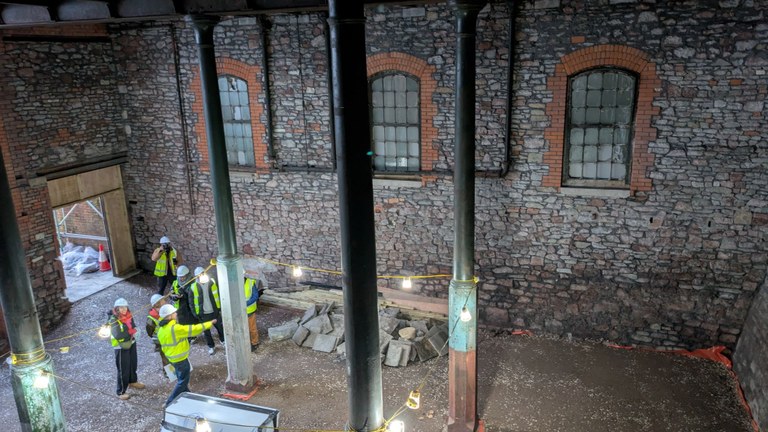
Opportunity: Development Consultant – Jacobs Wells Baths
Trinity Community Arts is seeking an experienced Development Consultant to support our National Lottery Heritage Fund Stage 2 application for the restoration of the Grade II–listed Jacobs Wells Baths.
This fixed-fee role (£9k, Feb–June 2026) will lead on finalising the Business Operating Plan and 5-year budget, using learning from pilot activity to evidence a sustainable future for this landmark community arts and heritage space.
The consultant will work with the CEO and Trinity Events Team and other project professionals including the capital team to provide “proof of concept” for how the space will work in the future. This is needed to inform key documentation (already drafted) that is required to submit our National Lottery Heritage Fund S2 Delivery Application (deadline 26 May).
Key programme dates
👉 Read the full brief and apply by 31 January 2026, 9am
Festus Market: A Festive Celebration of Culture & Community
Festus Market: A Festive Celebration of Culture & Community
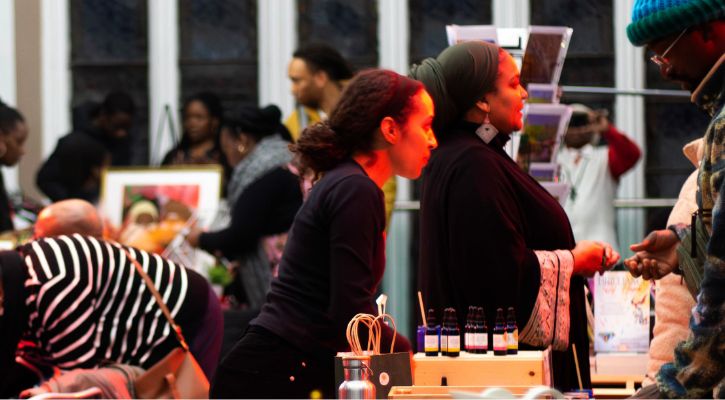
On Sunday 14 December, Festus Market brought the festive spirit to life with a joyful all-day celebration of African Caribbean and Black British culture. Running from 12:00 - 5:00 PM, the market welcomed visitors to browse, create, connect, and soak up the vibes, no ticket required, just good energy.
From handcrafted jewellery and clothing to homemade cosmetics and stationery, stall holders offered a brilliant range of thoughtful festive gifts. Families got stuck into craft-making activities, while the free badge-making workshop added an extra sparkle to the day. Up to 250 people came through our doors throughout the day. With delicious curry goat and chickpea plantain curry on offer, story sharing warmed the room, and a carefully curated soundtrack kept spirits high throughout.
The event was hosted by the iconic duo Dr Edson (aka Mr Festus himself) and DJ Bandyt, whose humour and impeccable musical taste tied the whole day together. Stall holders were invited to the mic to share their stories and showcase their work, creating a powerful sense of connection and visibility for local makers.
We also welcomed first-time stallholders, including Roy, who showcased and sold his work with the support of his family.
A raffle raised funds in support of Jamaica Hurricane Relief, with generous prize donations from traders and supporters.
“It was just a wonderful and heartwarming day,” said Parys Gardener, artist and stall holder. “It was lovely to share festive cultural traditions and bring a community of local makers together. Festus is for everyone and I can’t wait till next year!”
Reflecting on the day, Dr Edson Burton shared: “Fortune shone on Festus as the rain held off and the sun came out. Inside Trinity Centre, the tropical vibes were strong with stalls, music, activities, and an inspiring intergenerational mix of traders and visitors. Big up everyone who made it special. Till next year.”
And with that, Festus signs off, already counting down to the next one.
Thanks for shaping JWB's future
Thanks for shaping JWB's future
Face to face design scheme consultation at the Grain Barge, November 2025
Thank you for helping shape the future of Jacobs Wells Baths
I just wanted to say thank you for the consultation event you ran last Thurs. You did such an excellent job at hearing people's views and I can tell you all genuinely want the best for the community.
Katherine Piper, Business Development and Partnership Manager, Bristol City Leap
A huge thank you to everyone who joined us for the Jacobs Wells Baths community consultation sessions on 20 and 21 November. Over two days, 35 local residents, artists and community members took part in three lively and generous workshops at The Grain Barge, following guided tours of the building itself.
The sessions were led by Jo Harrop from Placed (Liverpool-based community engagement specialists), with support from the PH3 architectural design team. Together, we created space for open conversation, imagination and hands-on creative tasks that helped bring the future of Jacobs Wells Baths to life. What emerged was an inspiring and shared vision.
Participants spoke about wanting Jacobs Wells Baths to be a place full of activity and energy; hosting community groups, youth programmes, dance classes, rehearsals, performances and commercial events.
Just as importantly, you told us what would make the building work in practice: the facilities needed to support these activities, how spaces should feel flexible and welcoming, and what an inclusive experience should look like for everyone who walks through the door. These conversations have been invaluable.
Alongside insights from 70 responses to our online survey, your ideas, priorities and concerns have been captured in two consultation reports – a full detailed report and a shorter summary – which will directly inform the next stages of design, restoration and programming for the building. This consultation marks an important step in returning Jacobs Wells Baths to public use as a vibrant community and cultural hub, shaped by the people who will use it.
Please have a read of the results of the consultation below:
If you’d like to stay involved, you can join the Jacobs Wells Baths mailing list or express interest in our new Advisory Group, which will be established in January.Please email info@trinitybristol.org.uk to get involved.
Thank you again for your time, creativity and commitment to Jacobs Wells Baths. We couldn’t do this without you!
Meeting the Moment: A Reflection
Meeting the Moment: A Reflection
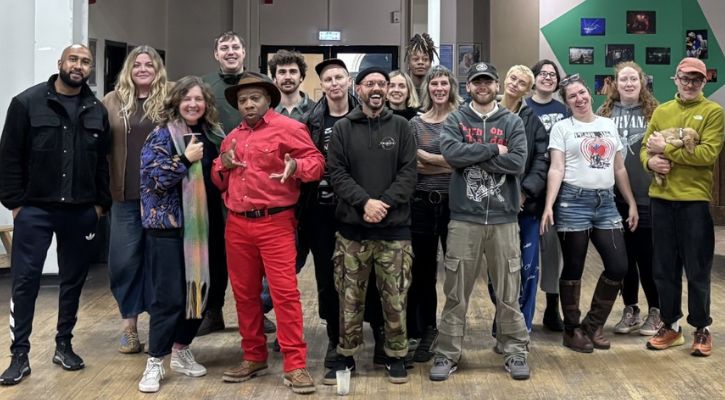
Last week, Trinity's Director of Culture, Jamell attended "Meeting the Moment" at the Watershed. This one-day event was designed for cultural organisations and aimed to empower senior leaders and trustees to speak out and drive change, even when they feel nervous or uncertain. One week on, Jamell reflects on the insights he gained from the day:
It was a day of BIG conversations and practical ways to work together, navigate differences, and find routes forward, even when our perspectives don’t always align.
It was energising to be at Watershed surrounded by so many like-minded people from across the cultural sector. Hearing from our own LaToyah McAllister-Jones of Citizens for Culture was a highlight, as she spoke about the group’s work with citizens’ assemblies and how they can bring people together to build common ground.
The workshops encouraged real self-reflection. For me, it was how I can have everyday difficult conversations better with my team and family in relation to other things, rather than far-right ideas, as with my colleagues and family, we are all on the same page most of the time (thankfully). But also within my work as Cultural Director, Programmer and Producer, I need to continue to advocate and elevate artistry and music that spreads a positive message of togetherness and elevates the underrepresented.
It was especially valuable to hear from Ellie Cartwright of Hope Not Hate on how to engage with and counter harmful or hateful narratives. That’s something many of us may need to navigate in different aspects of our work at Trinity, as well as in our day to day lives.
Alongside wonderful insights into sustainable theatre by climate activist and theatre Producer, Chloe Naldrett . Ned Suesat-Williams from The Crab Museums, an amazing way to integrate positive political messaging and fun crab facts, and director of Touretteshero, Jess Thom, on demanding and communicating change from her heartbreaking but bloody real story of cuts by our government.
Overall, it was a powerful day that felt like part of an ongoing journey, one that organisations and individuals continue to walk every day. But for me, it feels like in the music industry we need to be elevating these artists that are speaking out against the utter madness happening in this country and further. Cos we are in a mad time where protest in any form is being squashed. So the power of the arts needs to be upheld and continue to be platformed. That's my role and promise.
A Celebration of Bristol’s Voices - Poetic Placards & Billboards
A Celebration of Bristol’s Voices - Poetic Placards & Billboards
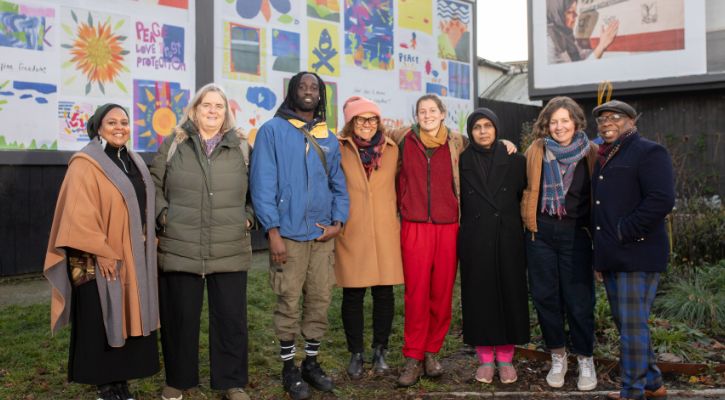
We’re reflecting on the energy and creativity shared at last week’s launch of Freedom 25: Poetic Placards & Billboards, Trinity’s contribution to the national Our Freedom: Then & Now programme led by Future Arts Centres. The project brings together 60 arts centres and libraries across the UK to mark 80 years since VE/VJ Day and explore what freedom means today.
Over the past four months, participants from across Bristol, including local residents, refugee and asylum-seeking communities, and Caribbean Elders, have taken part in creative writing sessions with Bristol City Poet, Sukina Noor, and Heritage Curator, Dr Edson Burton. These conversations and workshops uncovered personal reflections, memories and hopes, forming the foundation for a series of autumn printmaking sessions led by visual artist Sonja Burniston.
Their incredible work is on display in Trinity’s Graffiti Room November 2025 as part of a new exhibition of poetic placards and prints. Alongside this, a large-scale Billboard Art installation was unveiled last week in Old Market Community Garden, created in partnership with Build Hollywood and inspired directly by the words and ideas shared throughout the project.
Speaking after the celebration event, Jen, Trinity’s Arts Engagement Manager, said:
“Seeing participants find their voices reflected publicly was incredibly moving. This project has shown how creativity can build confidence, connection and a genuine sense of belonging.”
The launch brought together participants, artists, partners and supporters to mark the culmination of this collaborative journey and to celebrate Bristol’s rich tapestry of voices exploring what freedom means to our communities.
Artist Sonja reflected on her experience working with participants, saying:
"I think this project is really exciting and so important right now! It’s happening in art centres and libraries, places where people can come together to share and tell their stories. These gatherings help us feel connected and remind us that we’re not just shouting into the void or quietly holding onto our thoughts in a world that often seems a bit chaotic due to global politics."
Sonja continues:
"It’s comforting to realise there are others out there who share our beliefs and values. Without these spaces and moments to talk about what really matters, it can feel pretty lonely. I’ve found it really special to be with others who get it. We’re all allies in wanting freedom for each other, and it’s wonderful to advocate for that together!"
Please check out the Our Freedom film to experience these powerful reflections on freedom, identity and community.
Stay and Play: Story Time with Colourful Minds
Stay and Play: Story Time with Colourful Minds
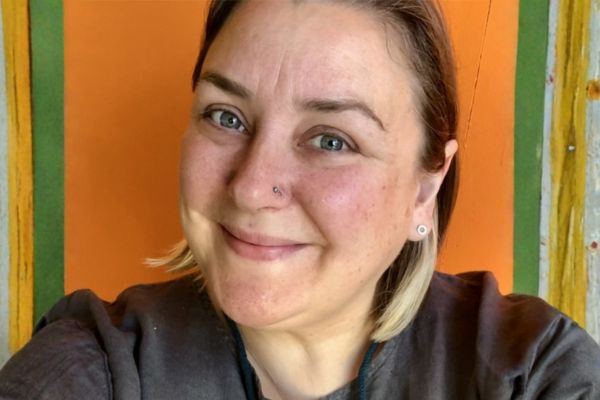
Since October, our much loved Friday morning early-years drop-in sessions have been back and thriving! Under the new Story and Craft format.
Led by the talented team at Colourful Minds, families have been enjoying a wonderful mix of play, creativity, and storytelling.
Hosted in our Main Hall, these sessions run during term time from 10:00 AM to 11:30 AM, offering parents and children the chance to connect through arts and crafts inspired by a different storybook each week. Each session ends with a cosy reading circle, bringing the story to life and creating a shared moment for everyone.
We’ve loved seeing familiar faces return and welcoming new families into the space.
We caught up with Laura Clifford, the CEO of Colourful Minds (and general wonderfully creative human). Here's what she had to say!
Q: When was Colourful Minds created?
Laura: I started Colourful Minds in 2016. At that time, I was a mum of two young children with a passion for making things. I wanted to create relaxed, hands-on art sessions that fit around family life. What began as a small idea at my kitchen table has grown into a variety of creative workshops for people of all ages in schools and venues across Bristol.
Q: What is the Colourful Minds ethos or mission?
L: At the heart of Colourful Minds is the belief that creativity brings people together. Our mission is to spark imagination, build confidence, and encourage play through art and craft, with a special focus on different generations creating side by side and discovering the joy of the creative process.
Q: Where else can we see Colourful Minds in Bristol?
L: You can find me running a monthly Saturday Art Club at The Bristol Loaf at Bristol Beacon, Holiday Art Clubs at Campus Skateparks, and a Grown-Ups Sketchbook Club at Kiln Workshop, along with many more pop-up sessions around the city. To stay updated on new workshops and tickets, follow Colourful Minds Bristol on Eventbrite.
As we wrap up a fantastic term of creative mornings, we want to thank every family who has joined us and helped make Stay and Play such a warm, welcoming space.
We can’t wait to continue this journey in the new year with more stories, crafts, and community connections.
Sessions run every Friday until the 19th December, come along!
28 November 2025
05 December 2025
12 December 2025
19 December 2025
Trinity is Part of a New Festival!
Trinity is Part of a New Festival!
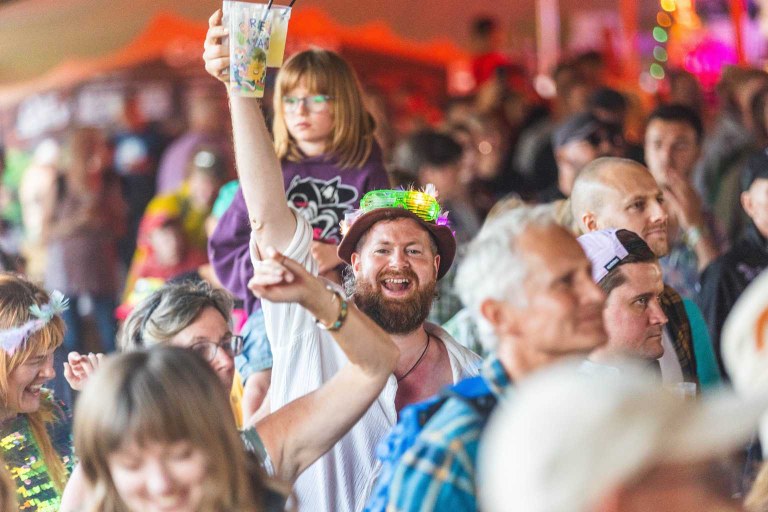
Trinity is proud to be a partner in Where It All Began, a brand-new, not-for-profit festival with a bold new approach to festival organisation.
Set up by our friends at Chai Wallahs, and supported by Music Venues Trust, The Association of Independent Festivals, and Arts Council England, Where It All Began is designed to look after and represent the grassroots while providing an affordable, accessible festival experience for everyone.
In response to the challenges facing the UK’s independent festival scene, grassroots venues, and artists, Where It All Began aims to bring creative communities together, provide platforms for underrepresented artists, and celebrate the heart of grassroots culture. This is a festival model built on collaboration, inclusion, and sustainability, one that puts people and community first.
“This is a strong project that we’re proud to be part of, and a great opportunity for Trinity to continue driving the work we’ve championed for many years. It allows us to showcase more of the incredible artists from our city, Bristol, while creating greater opportunities for underrepresented artists and events staff.
"A festival like this is needed, as many line-ups are headliner driven. This model creates a level playing field and, I feel, will offer a better overall experience, without the mad rush to see huge artists. There are already smaller festivals hitting the nail on the head, but this will add to the wonderful ecosystem of grassroots festivals that help build a real sense of community for years to come,” said Jamell Ackford, Director of Culture at Trinity.
"Where It All Began" is set to take place from June 18th to 21st, 2026, at Grange Farm in Cambridgeshire, the home of the legendary Secret Garden Party. The event will showcase a wide array of exceptional musicians and artists, featuring some of the finest sound systems in the UK. Attendees can also look forward to an impressive selection of innovative, eclectic, and delicious food and drink vendors.
Before the festival launches, the team behind Where It All Began want to hear directly from you. Your feedback will help shape how the festival is organised, what it represents, and how it can best serve the grassroots community.
By completing a short 2-minute survey, you’ll also have the chance to win some brilliant prizes, including:
-
Festival tickets
-
Chai Wallahs & artist merch
-
Chai bar tabs
-
Exclusive DJ mixes
-
Local gig tickets
“We’re excited to support a project that puts artists, audiences and communities at the centre of the festival experience,” said Cassie Madly, Music Program Manager, Trinity.
“Where It All Began reflects the same values that drive everything we do; collaboration, creativity, care and support for the grassroots.”
Your voice and opinion matter. Join the movement and help shape a festival where true festival culture can thrive once more.
Complete the survey here
Watch the video & visit the Crowdfunder here
About Chai Wallahs
When it comes to supporting the Grass Roots Music scene, providing consistent platforms for Independent artists, and the perfect performance environment, there really is only one festival venue capable of delivering.
Through years of careful curation, the preservation of relationships between stage, artist, and industry, and the steadfast, unquenchable desire to provide the festival audience with the finest acts that the Grass Roots scene has to offer; Chai Wallahs has become the UK’s Unrivalled, Critically Acclaimed, Independent, Festival venue. The alternative to the mainstream.
Throw truly unique, limitlessly characterful, ethically sound, bar and catering capabilities into the mix, and you have an all-encompassing space, adept in fulfilling all your festival desires.
Have your say: Jacobs Wells Baths
Have your say: Jacobs Wells Baths

Banner produced by the Jacobs Wells Baths Community Hub group, c 2017
Have your say on the future of Jacobs Wells Baths!
As the first bit of new fabric goes on the building, we’re thrilled to have reached an exciting milestone in the journey to bring Jacobs Wells Baths, a much-loved historic building in the heart of Bristol, back to life as a vibrant arts and heritage space.
Now, we want YOU to help shape its future.
This is your chance to have a real say in how the building is used, what kind of activities it hosts, and how it can best serve the community. Whether you’re a dancer, artist, producer, cultural institution, youth project, events organiser, community group, or just someone with a passion for Bristol’s heritage, your input is invaluable.
Alongside face-to-face consultation, we’re asking anyone with an interest in this building's future to complete a short survey to help us:
- Take the architectural plans to the next stage
- Inform the business planning for sustainable use of the building
- Ensure the space meets the needs and aspirations of the people who will use it
What could Jacobs Wells Baths offer you in the future?
Complete the survey by midnight, 24th November to make sure your voice is heard.
We’ll share the results alongside the outcome of our upcoming stakeholder consultations so you can see how your ideas are helping shape this exciting project.
This is more than just a building. It’s a chance to create a community-led, heritage-rich hub for arts, culture, and creativity in Bristol.
Don’t miss the opportunity to be part of its future!
Chair's Report 2024/25
Chair's Report 2024/25
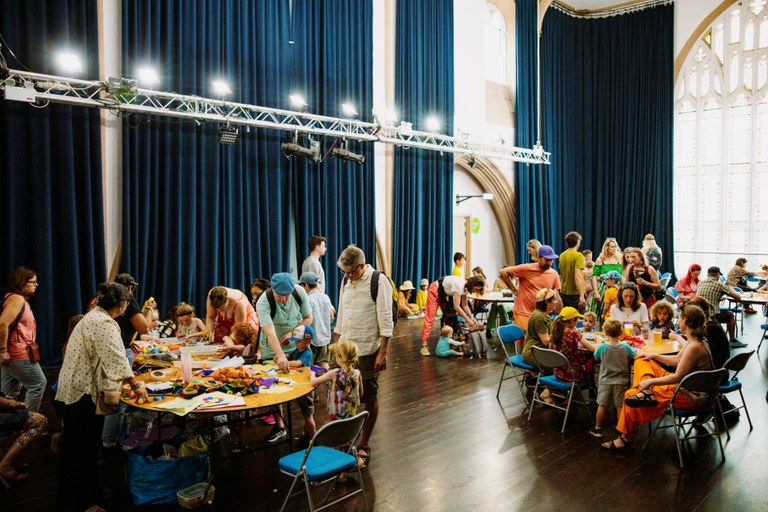
Trinity Garden Party, May 2024 - Image by Alistair Brookes
As I conclude my second year as Chair of Trustees, I remain deeply inspired by the continued passion and resilience of our community, team, and partners. Thank you to everyone who has stood alongside us — your support continues to be the foundation of our success.
This year’s Annual Report offers a powerful reflection on how far we’ve come. Building on the foundations laid in 2023/24, we’ve not only sustained a vibrant, inclusive cultural programme but also deepened our roots across the city - reaching new audiences, developing stronger partnerships, and affirming our role as a civic hub.
Over the year, we welcomed 70,998 visitors through our doors - taking part in everything from grassroots gigs to family-friendly festivals. The successful delivery of our Children & Young People’s Programme, including the launch of a two-year Cultural Alliance strategic partnership with three local primary schools.
We delivered an expanded offer of free and low-cost community activities reaching communities and neighbourhoods in our immediate catchment area. The successful embedding of a targeted place-based neighbourhood programme led to the co-design of a new adult provision in partnership with Bristol Drugs Project and Bristol College of Art.
Many will be familar with Trinity as a live venue and our audiences of over 40,000 attendees took part in a diverse cultural offer of over 1,400 events featuring 326 artists across multiple artforms and disciplines.
Beyond our walls, we also strengthened commitment to equity by playing a strategic role in the West of England Combined Authority's first Citizens’ Assembly, to shape a citizen-led cultural delivery plan for the region.
Notably we also progressed in our efforts to restore Jacobs Wells Baths - undertaking the first steps to transform it into a much-needed civic arts space for Bristol and the wider region.
I’m especially proud of how the Trinity team has continued to lead with integrity and creativity. Their willingness to adapt, experiment, and work collaboratively has ensured our work remains relevant, responsive, and impactful.
As we look ahead, we do so with renewed focus. We know the challenges our communities face, but we also recognise the role creativity plays in shaping a more hopeful, connected future. Together, we remain committed to our mission: Creative Expression for All.
Thank you once again for being part of this journey.
With appreciation and sincerest thanks to all who took part, worked with and supported us throughout the year.
Chris Luffingham, Chair of Trustees
Is Creativity The Antidote To Cultural Illiteracy?
Is Creativity The Antidote To Cultural Illiteracy?
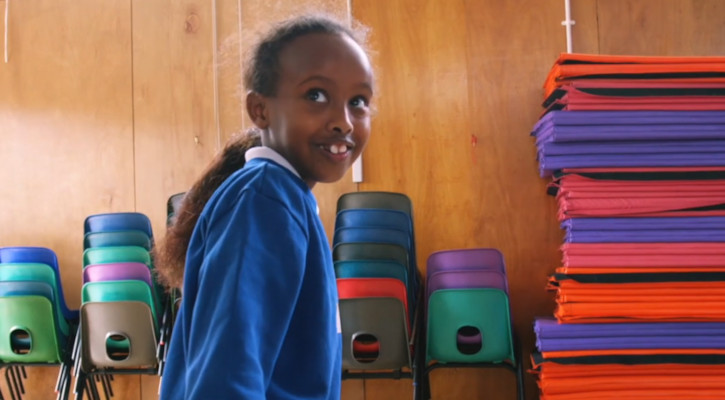
The Observer recently asked whether we are “raising a culturally illiterate generation,” highlighting the impact of reduced arts provision in schools. At Trinity, our 2024 community consultation and targeted work with local schools confirmed the challenge but also showed that creativity has the power to meaningfully engage pupils with learning, can transform classrooms, build confidence, and strengthen inclusion.
Through our Cultural Alliance programme, a two-year initiative supported by Paul Hamlyn Foundation, we’ve partnered with three Bristol primary schools to bring weekly creative learning to every Key Stage 2 pupil. Working with community partners acta (theatre) and Movema (dance), we have co-designed an arts-based curriculum that links art into their everyday school learning themes and introduces children to new skills while supporting their wellbeing and engagement with learning.
Even after just one year, the impact is positive and clear. Pupils are gaining confidence and teamwork skills, teachers are discovering fresh tools to engage their classes, and schools are starting to see creativity as a catalyst for stronger connection. Parents, too, are recognising Trinity as a trusted partner in their child’s education, and are reporting that their children are sharing their learning more at home due to the creative ways in which they are learning.
One year 4 pupil from Evergreen Primary said: “Being active helps our learning. Our dance sessions are a different way of learning and give us good energy.”
Our evaluation, led by Dr Harriet Hand (University of Bristol), asks deeper questions about arts in schools: How can it reduce absenteeism, challenge assumptions about behaviour, and support inclusion? As Furaha Asani, Associate Researcher at Paul Hamlyn Foundation, notes: “Through a more relaxed, embodied, and playful environment, young people can access different ways of engaging - socialising into a new kind of contract with the learning environment, one built on trust.”
This is our antidote to cultural illiteracy: creativity that nurtures resilience, builds connection, and equips children not just to succeed at school, but to thrive in life.
Jacobs Wells Baths – Summer Works Update
Jacobs Wells Baths – Summer Works Update
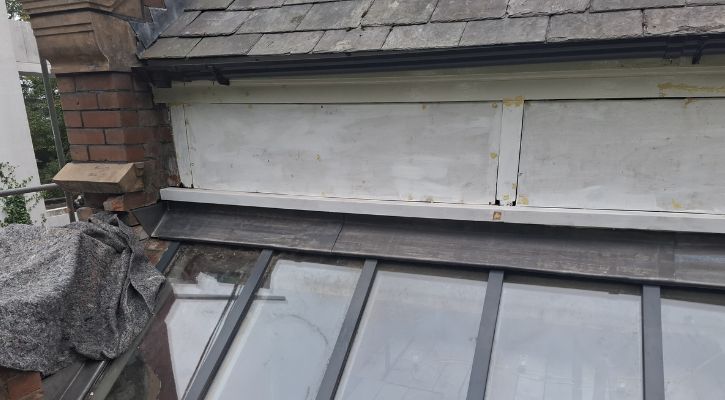
Significant progress has been made at Jacobs Wells Baths over the summer months, as Phase 1 restoration works continue to transform this much-loved Grade II Listed building into a vibrant hub for community, creativity, and culture.
A major step forward this summer was the completion of extensive asbestos decontamination, made possible through funding from the Community Ownership Fund and match funders.
This vital work has opened up parts of the building never before accessible to the public – including The Pump Room, whose raw industrial character hints at exciting potential for future arts and cultural use.
Comprehensive condition surveys have also been completed in partnership with Mann Williams and PH3 Design, alongside ecological and specialist heritage assessments with input from an industrial heritage expert.
Mann Willimas commented:
"We are proud to be supporting the restoration project to save Jacobs Wells Baths, embracing its vision for a bold and ambitious future"
Repairs to the South Studio roof, supported by Historic England and other funders, mark the first visible transformation of the building’s fabric, with new glazing now installed.
Carrek Ltd has led specialist conservation works including roof and masonry repairs, and has now been appointed as lead contractor for the main hall roof restoration. Planned works will ensure the building becomes watertight, energy-efficient, and sustainable for the long term, with improvements to drainage, masonry, and rainwater systems.
Carrek Ltd commented:
“Jacobs Wells Baths, a Grade II listed Victorian landmark in Bristol, is undergoing a major restoration after years of vacancy. Thanks to funding from the Community Ownership Fund, the National Lottery Heritage Fund, and others, the site is being revived as a vibrant hub for arts, youth, and community activity via Trinity Community Arts.
Specialist conservation work has included: Re-roofing, Glazing, Masonry repairs and the restoration of historic features and original brickwork. Skilled craftsmanship is helping to preserve the building’s unique character for future generations.”
The many roofs of Jacobs Wells Baths – covering the South Studio, Main Studio (former swimming pool), and North Wing – are defining features of this “people’s palace.” Originally designed to flood the interiors with natural light, these structures now present a significant conservation challenge due to their scale and delicate construction.
“The roofs present a real challenge owing to their huge scale and the delicate nature of their construction. These works – which have already commenced with the restoration of the South Studio glazing thanks to support from Historic England is a huge step forward. The next phase will focus on the Main Studio roof – allowing light to once again fill the space and marking a major milestone in the restoration and repair of this historic Victorian bathhouse.
The extensive scaffolding required will be a remarkable sight in itself, wrapping the building so that work can continue whatever the weather.”
– Nicola Dyer, Project Manager
Further enabling works are underway, including the temporary removal of the sprung dance floor to reveal the historic pool basin and erection of a complex scaffolding system to support roof works. This is a big and complex project that could not happen without continued support from our funders and the community.
Whilst access into the building is still limited, alongside construction work, the project team has been busy building connections with the local community. Over the summer, family drop-in sessions at Brandon House and the first “I Danced in Jacobs Wells” reminiscence event brought together former dancers and residents to share memories of the building’s past. These stories will form part of a growing digital archive celebrating stories, heritage and people.
“The sessions brought people together as they went on. More and more attendees joined, and we all had a great time! The activities were planned well, and the organisers did an excellent job. The children enjoyed themselves, and I hope we can have more sessions like this in the future.”
– Fartun Noor, summer community activity participant
This November, the team will host further community consultation sessions, including creative workshops with Hotwells Primary, Willow Park Primary, and Cotham Secondary, led by heritage specialists Local Learning. These sessions will inform Phase 2 restoration and design plans, ensuring that youth and community voices help shape the building’s future.
Get Involved
Stay up to date with restoration progress, events, and opportunities to take part:
Join our mailing list or contact jude@trinitybristol.org.uk for information on upcoming community consultation sessions and community activities.
About Saving Jacobs Wells Baths
Trinity is on a mission to transform a Grade II listed Victorian bathhouse and former dance centre in Hotwells, Bristol - once at risk of being lost - into a vibrant multi-use community, arts and heritage hub.
In 2023, Trinity secured a 35-year lease on the building and launched a public campaign to restore and reopen the iconic heritage site as a multi-purpose community arts hub. Read more here.
Vacancy: Bar Staff
Vacancy: Bar Staff
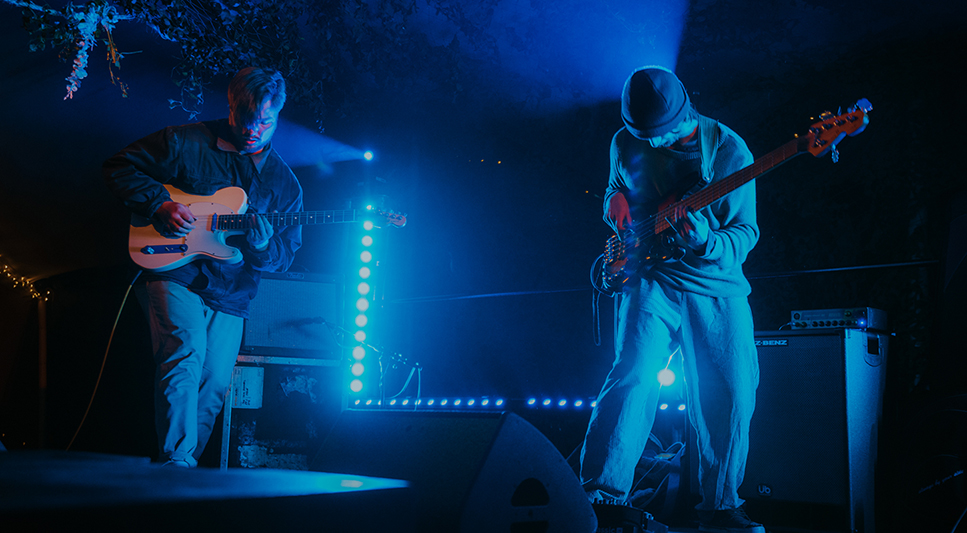
Waldo's Gift performing at Trinity in 2021. Photo Khali Ackford
Casual Bar Staff
£12.60ph* basic (+10% for anti-social hours), shifts vary
Deadline: Open call
We are looking for casual Bar Staff to join our team in time to help us with the delivery of our varied event programme.
The role will require someone who is willing to work flexibly according to our growing events calendar which includes everything from community meetings and conferences, live performances, club nights and weddings. We are looking for someone who is passionate about people.
How to Apply
- download the job description and person specification
- complete our anonymous online equal opportunities monitoring form - this will not be used as part of the selection process
- send a CV to info@trinitybristol.org.uk with the subject header ‘Casual Bar Staff’
Trinity is an Equal Opportunities employer and actively encourage applications from all backgrounds and communities. We recommended reading the job description and person specification thoroughly and describe exactly how you meet the requirements as this is the basis on which candidates will be shortlisted for interview.
We will make reasonable adjustments to the recruitment process if you have a disability or long-term health condition, or if you need something different or additional as part of the recruitment process. To discuss your requirements, please get in touch on info@trintybristol.org.uk/ 0117 935 1200 or pop into the Trinity Office between 9:30am-4pm Monday-Friday.
Please see our Recruitment Policy for further information.
*Starting rate shown as of October 2025 - rates subject to increase in line with Living Wage Foundation changes
A Tale of Twin Cities
A Tale of Twin Cities
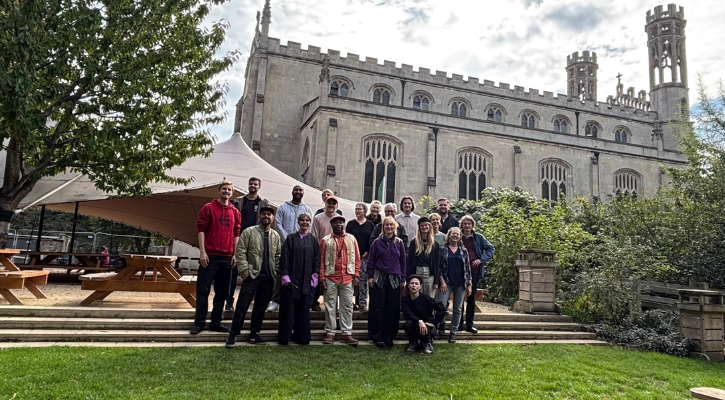
Through Bristol’s Twin Cities links, we had the pleasure of hosting a delegation from Hannover as part of a ‘multiplier trip’ supported by Hannover's Culture Team. This was a brilliant chance to share ideas, energy and experiences across our cultural and creative programmes.
There was lots of enthusiasm, curiosity and common ground. We’re looking forward to keeping the conversations going with the organisations we met and seeing where this can lead in terms of future sharing, programming and collaboration.
Initiated and funded by Hannover’s Culture Team, the project aimed to strengthen democratic values, intercultural exchange, and international cohesion. The visit brought together cultural workers, educators, youth leaders, and civil society groups to foster collaboration and shared learning.
We were happy to meet with Kiriakoula Kremantzouli, head of the Cultural Center Pavillon and Paul Schwendel, sound technician at the Cultural Center Faust - two great places for culture and community in our sister city Hannover. Kiriakoula said:
"It was an inspiring meeting and a great pleasure to get to know the dedicated people from Trinity. We were able to identify many similarities in our cultural work: from excellent international music booking to working with different communities, which make Trinity a safer place for encounters, creativity and participation."
This builds on our recent trip to Bordeaux, where we were met with Le Rocher de Palmer. "That visit felt like the start of something special – with plans in the pipeline for an artist exchange, opportunities to learn from each other’s practice, and a music day festival in 2025 -kicking off in Bristol before heading to Bordeaux, with the same line-up in both cities – watch this space!" - Adam Gallacher, Deputy CEO The Trinity Centre
None of this would have happened without the connection and support from Bristol City Council’s Twinning Team – huge thanks to Zoe for her energy and for helping to make these links a reality.
It feels like the beginning of some really exciting international friendships, and we can’t wait to see how they grow.
The ‘Multiplier’ visit was also supported by Bristol-Hannover Council (BHC). This volunteer led Twinning Association was founded in 1947 as one of the earliest city links with Germany and helps manage a range of initiatives between the two cities. BHC works to facilitate exchanges of citizens, holds cultural and social events, and welcomes and assists groups visiting Bristol from Hannover, with particular emphasis on encouraging exchanges for young people in sport, music and culture. They welcome new members - for more info visit Bristol Hannover Council




